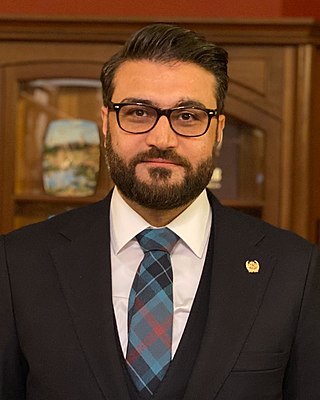
Babrak Karmal was an Afghan communist revolutionary and politician who was the leader of Afghanistan, serving in the post of General Secretary of the People's Democratic Party of Afghanistan for seven years.

Mohammad Najibullah Ahmadzai, commonly known as Dr. Najib, was an Afghan communist politician who served as the General Secretary of the People's Democratic Party of Afghanistan, the leader of the one-party ruling Democratic Republic of Afghanistan from 1986 to 1992 and as well as the President of Afghanistan from 1987 until his resignation in April 1992, shortly after which the mujahideen took over Kabul. After a failed attempt to flee to India, Najibullah remained in Kabul. He lived in the United Nations headquarters until his assassination by the Taliban after their capture of the city.
The following lists events that happened during 1991 in Afghanistan.

The Islamic State of Afghanistan was the government of Afghanistan that was established by the Peshawar Accords of 26 April 1992 by many, but not all, Afghan mujahideen parties, after the fall of the socialist government. Its power was limited due to the country's second civil war, which was won by the Taliban, who took control of Kabul in 1996. The Islamic State then transitioned to a government in exile and led the anti-Taliban Northern Alliance. It remained the internationally recognized government of Afghanistan at the United Nations until 2001, when the Transitional Islamic State of Afghanistan was created and an Afghan Interim Administration took control of Afghanistan with US and NATO assistance following the overthrow of the first Taliban government.

The National Museum of Afghanistan, also known as the Kabul Museum, is a two-story building located 9 km southwest of the center of Kabul in Afghanistan. As of 2014, the museum is under major expansion according to international standards, with a larger size adjoining garden for visitors to relax and walk around. The museum was once considered to be one of the world's finest.
Sultan Ali Keshtmand, sometimes transliterated Kishtmand, was an Afghan politician. He served twice as Chairman of the Council of Ministers during the 1980s, from 1981 to 1988 and from 1989 to 1990 in the Democratic Republic of Afghanistan.

Lieutenant General Shahnawaz Tanai was an Afghan politician and general officer who served as the Chief of General Staff of the Afghan National Army until his defection to neighbouring Pakistan following a failed coup d'état in 1990.

Ajmal Shams is an Afghan politician and former civil engineer.

The 1989–1992 Afghan Civil War took place between the Soviet withdrawal from Afghanistan on 15 February 1989 until 27 April 1992, the day after the proclamation of the Peshawar Accords proclaiming a new interim Afghan government which was supposed to start serving on 28 April 1992.

Zarar Ahmad Moqbel Osmani is a politician in the Islamic Republic of Afghanistan who served as Minister of Foreign Affairs from 2013 to 2015 and Minister of Interior from 30 September 2005 to 11 October 2008. He previously served as Minister of Counter Narcotics and as Governor of Parwan Province. Prior to this he served as Chief of Police of Parwan province and as First Secretary to Afghan Embassy in Tehran. He also joined the mujahideen during the Soviet–Afghan War, fighting against the Afghan government led by Mohammad Najibullah.
The following lists events that happened during 1990 in Afghanistan.
The following lists events that happened during 1992 in Afghanistan.

The Democratic Republic of Afghanistan was the government of Afghanistan between 1978 and 1992. It was recognised diplomatically by only eight countries which were allies of the Soviet Union. It was ideologically close to and economically and militarily dependent on the Soviet Union, and was a major belligerent of the Afghan Civil War.
Mohammad Yousef Pashtun is an Afghan technocrat and politician. He served as Minister of Urban Development and Housing for two terms and as Governor of Kandahar province in 2003, replacing Gul Agha Sherzai under President Hamid Karzai's administration. In 2010, he was appointed as Senior Adviser to President Karzai on Construction, Mines, Water & Energy. In 2014, minister Pashtun continued to serve as Senior Adviser to President Ashraf Ghani. Yِousef Pashtun is also chairing the Kabul New City Development Authority Board.
Engineer Abdul Rahim was appointed the Afghan Communications Minister of the Afghan Interim Administration—the first post-Taliban government in 2002. Abdul Rahim was from the Tajik ethnic group.

Dr. Zabihullah Mojaddidy is an Afghan politician. He served as the Governor of Kabul Province between July 2009 and until resigning in March 2011. His resignation was due to a lack of support from development ministries and the Presidential Palace in regard to his ideas for the reconstruction of Kabul City. Prior to becoming governor, he served as the Deputy Minister of Higher Education.

General Khodaidad is a former Minister of Counter Narcotics of Afghanistan.

Hamdullah Mohib is an Afghan politician and former diplomat.
Hamidullah Farooqi is an Afghan politician, economist and activist. He has written several research papers and served in higher positions within the Islamic Republic of Afghanistan’s government. Farooqi currently serves as the Chancellor of Kabul University and Advisor Minister to President Mohammad Ashraf Ghani on Higher Education. He previously served as Minister of Transport and Civil Aviation from March 2009 to January 2010 in the cabinet of former President Hamid Karzai.

The 1990 Afghan coup d'etat attempt occurred on March 6, 1990, when General Shahnawaz Tanai, a hardline communist and Khalqist who served as Minister of Defence, attempted to overthrow President Mohammad Najibullah of the Republic of Afghanistan. The coup attempt failed and Tanai was forced to flee to Pakistan.











